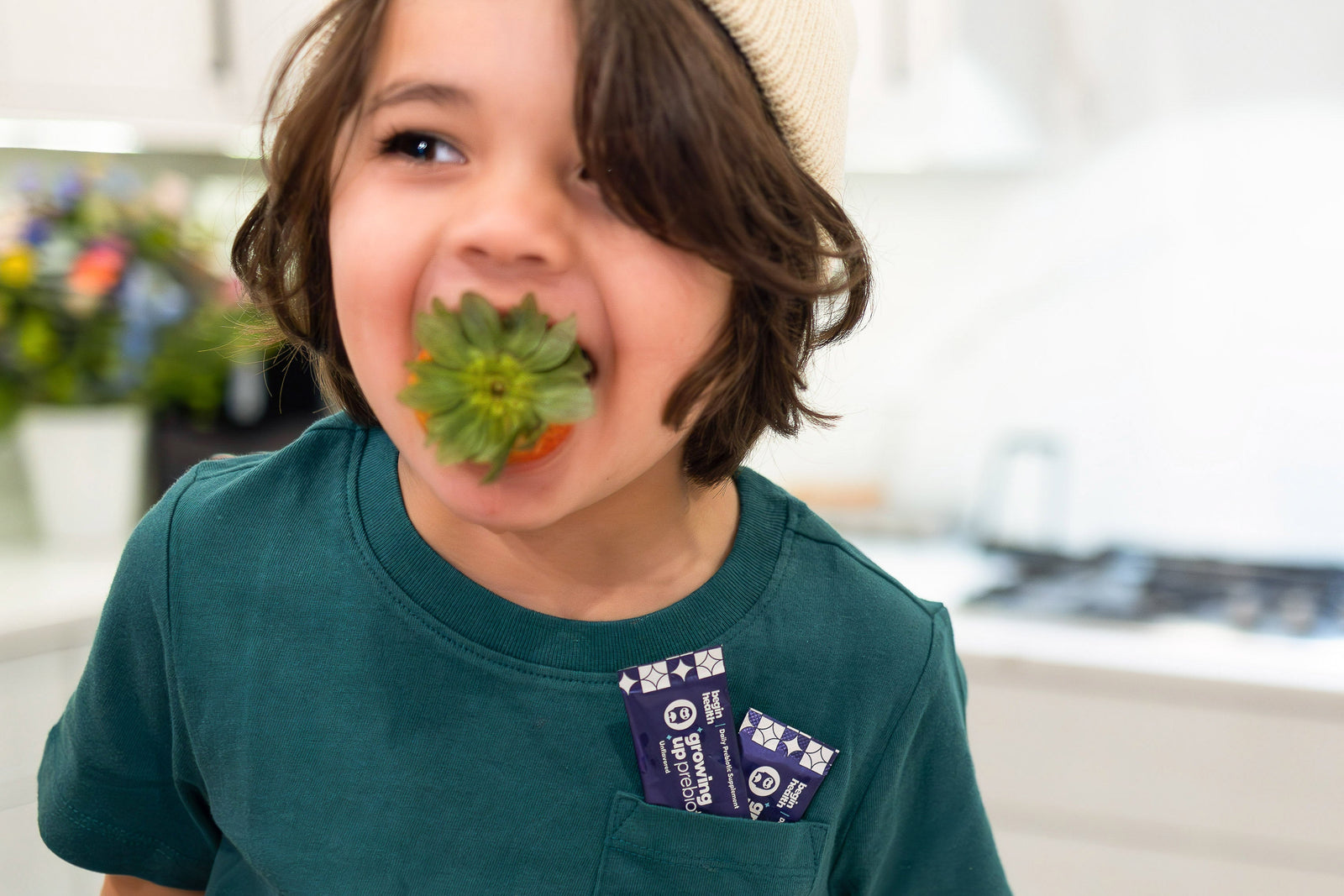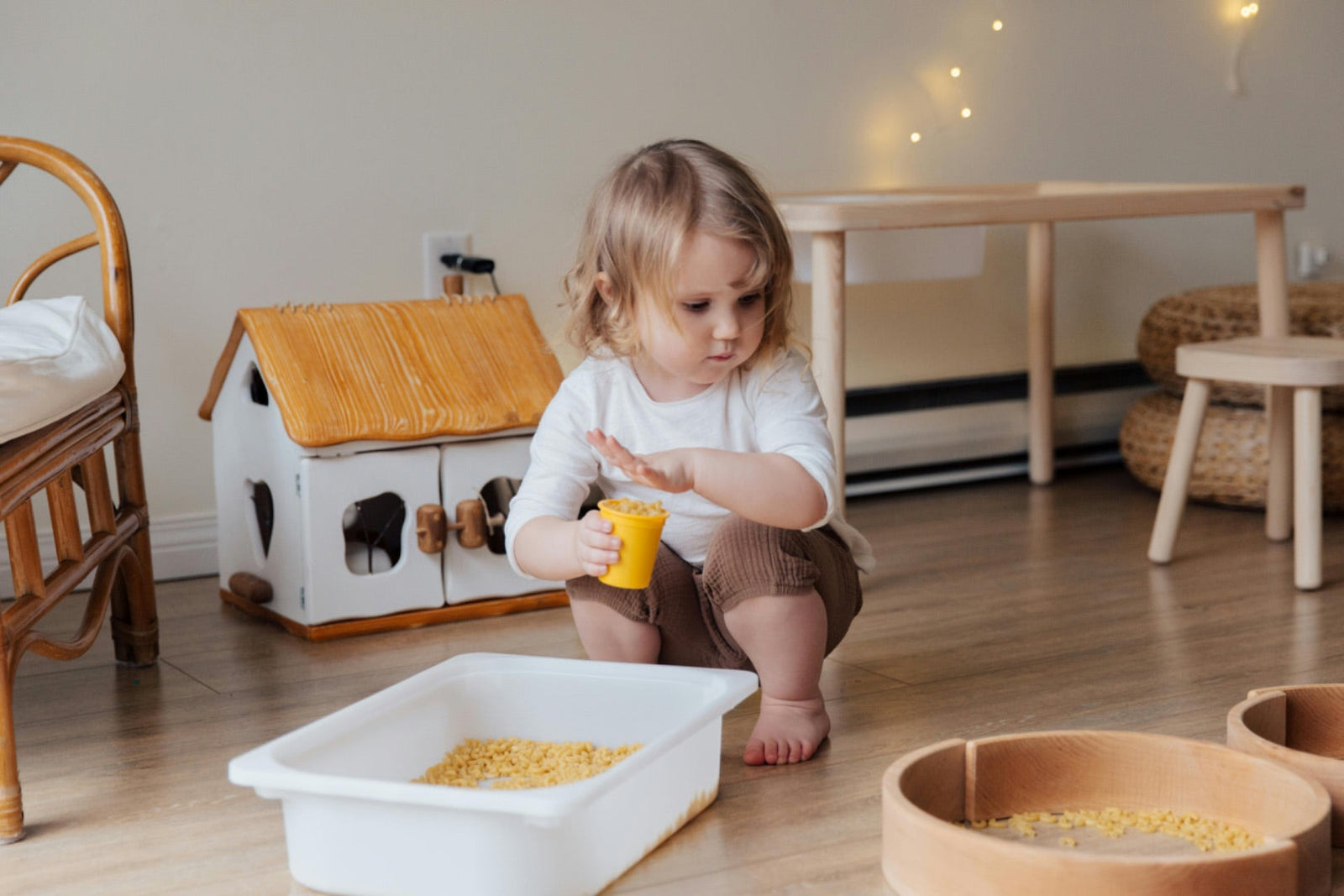Your Cart is Empty
Continue shoppingThe 3 F's for Kids Constipation Relief
Medically Reviewed by May Zhu, RDN | Published December 18, 2023
share this article

Constipation in kids can be a concerning issue affecting their comfort and overall well-being. As a Registered Dietitian, I've found that addressing constipation often requires a multifaceted approach. For parents, we often emphasize three crucial factors: fiber, fluids, and fitness. Also known as the “3 F’s”, combining these factors can help with constipation support in kids. Let’s review how fiber, fluids, and fitness can help with our little one’s constipation relief strategy.
1. Fiber: A Key Player in Kid’s Digestive Health
Fiber plays a pivotal role in maintaining regular bowel movements. Increasing dietary fiber intake can soften stools, making them easier to pass [1]. The American Academy of Pediatrics recommends age-appropriate daily fiber consumption to help with constipation in kids [2]. Foods rich in fiber include fruits and vegetables such as pears, apples, and carrots.
Recommended Daily Fiber Intake by Age
|
Age (years) |
Fiber (grams) |
|---|---|
|
1 to 3 years |
19g |
|
4 to 8 years |
25g |
|
9 to 13 years (female) |
26g |
|
9 to 13 years (male) |
31g |
Source: Cleveland Health Clinic
Begin Health Expert Tip
Prebiotics are a special type of fiber that supports constipated kids by helping to promote softer, more frequent poops [6]. This type of fiber is naturally in foods such as apples and carrots, but for families who have pickier eaters or just need additional help getting consistent fiber into their diet, Growing Up Prebiotics can provide the gut health boost they need to support their health. Every serving provides 3g of daily fiber to help build a balanced microbiome. Our prebiotics are tasteless, textureless, and can be incorporated into your little one’s water or favorite beverage.
2. Fluids: Hydration for Smoother Poops
Adequate hydration is essential for preventing and alleviating constipation. Water helps fiber do its job by softening stools and aiding in their movement through the digestive tract [3]. Encouraging kids to drink enough water throughout the day to prevent dehydration is a critical part of maintaining regular bowel habits.
|
Kids Hydration Recommendations by Age |
|
|---|---|
|
Age |
Liquid Amount |
|
Infants (0 - 6 months) |
Breastmilk or formula as their only source of hydration. Small sips of water can be introduced with solid foods between 6 - 12 months. |
|
Toddlers (1 - 3 years) |
Half an ounce of water for every pound of body weight |
|
Kids (ages 4 and above) |
Half an ounce of water for every pound of body weight |
Source: Children’s Hospital of Orange County
Begin Health Expert Tip
For more ways to increase hydration in your kiddos, check out our blog: 15 Creative Ways to Get Your Picky Eater to Drink More Fluids.
3. Fitness and Fun: Active Lifestyle and Stress Management
Believe it or not, stress and inactivity can contribute to constipation in kids [4,5]. Studies reveal that preschool kids who move 60 minutes or more daily have a lower risk for developing symptoms from constipation [7]. Engaging in physical activity not only promotes overall health but also stimulates bowel movements, which helps stool move along the digestive tract [8].
Additionally, stress and psychological impact can alter gut motility and colon transit time [9]. Stress from anxiety has been associated more frequently in kids who struggle with functional constipation [10]. For kiddos who are potty training, stress from traumatic potty experiences can lead to withholding, which can also be a contributing factor for constipation.
Because of this, stress management through enjoyable activities and a relaxed environment is crucial and can positively impact bowel regularity in kids.
Daily reads to help your little ones lead happier and healthier lives.
Buy Now
Join the
Happy Gut Club
Summary
Constipation in kids is often managed through a multifaceted approach that often includes fiber-rich nutrition, adequate hydration, and an active, stress-free lifestyle. By remembering the 3 F's - fiber, fluids, and fitness/fun, you can help build a better action plan for constipation relief in your kiddos. Remember, consistency and patience are key when making dietary and lifestyle adjustments. Implementing healthy habits daily can create the foundation your kiddos need for long-term gut health. For more information about healthy habits that support gut health in kids, check out this blog: 5 Healthy Habits for Kids Constipation Support.

Author
May Zhu, RDN
Trending

Oxalates and Kids' Digestion: How High-Oxalate Foods Contribute to Constipation and Gut Discomfort
read now
5 Signs Your Toddler Needs a Poop Test
read now
Toddler Poop Issues: What Different Poop Colors Mean and When to Worry
read now






